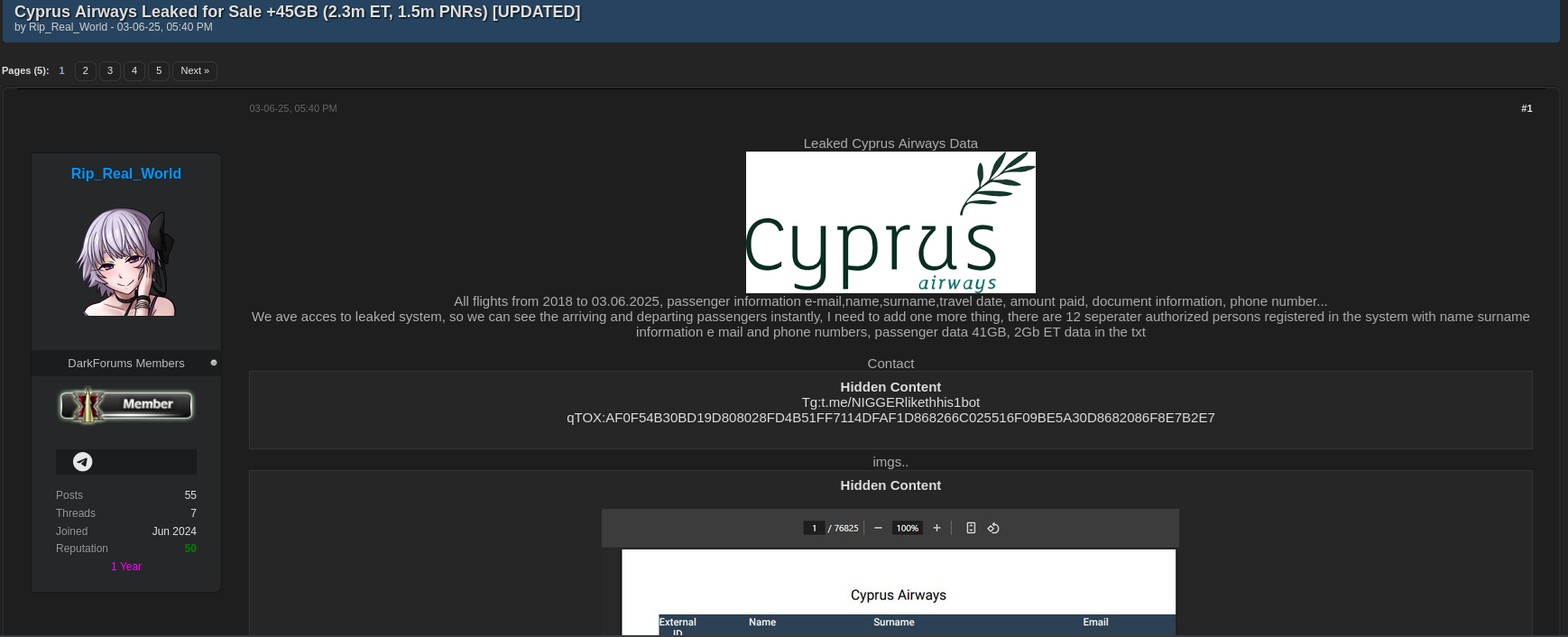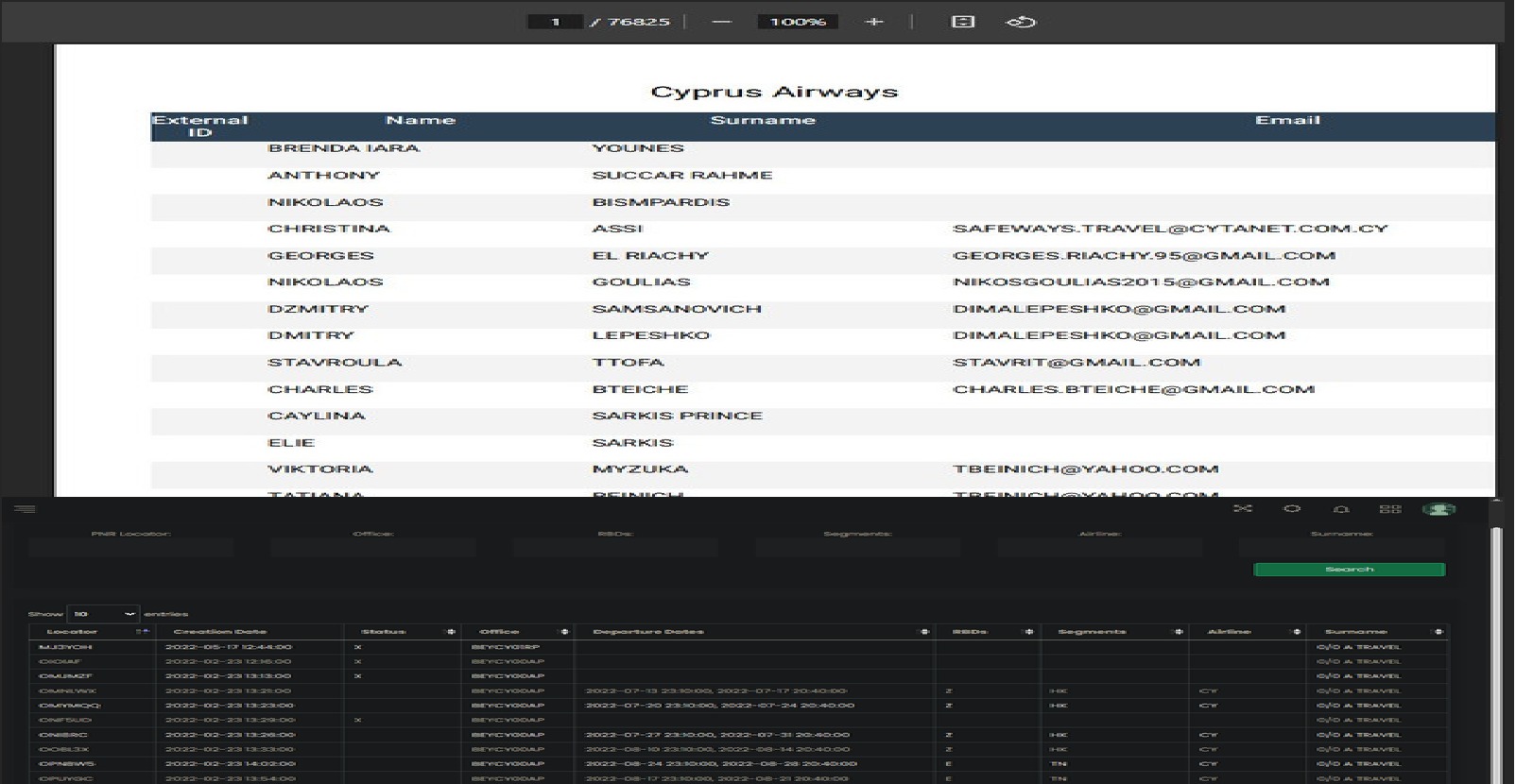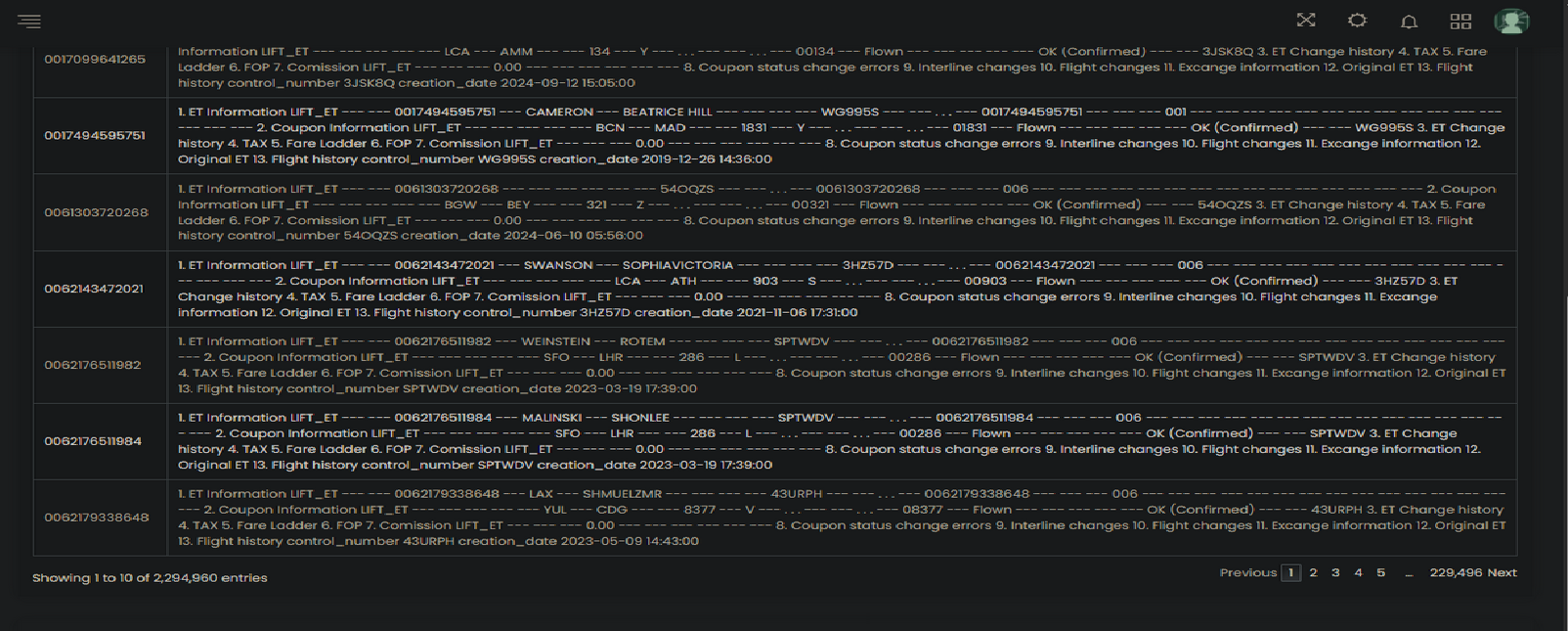Cyprus Airways Data Breach Revealed: 5 Urgent Facts You Must Know

➤Summary
Cyprus Airways Data Breach Overview
The Cyprus Airways data breach has rocked the aviation sector, putting the personal and financial details of thousands of passengers at risk. Exposed on Darkforums.st in early June 2025, the leak contains more than 41GB of passenger data and 2GB of ET text files. First uncovered by The Kaduu, a cyber monitoring group, the post appeared under the alias Rip_Real_World and immediately raised alarms across cybersecurity communities. 🚨
According to the author, the database isn’t just static — attackers allegedly retain live access to airline systems, enabling them to monitor arriving and departing passengers in real time. For travelers, this could mean far more than a phishing email; it suggests ongoing surveillance risks.
👉 For immediate cyber support, visit DarknetSearch Cyber Support.
Where Was the Database Posted?
The leaked information was first spotted on Darkforums.st, one of the darknet’s most notorious trading grounds for stolen data. The post, shared in early June 2025, detailed an unprecedented level of access to airline systems.
The attacker wrote:
“All flights from 2018 to 03.06.2025, passenger information e-mail, name, surname, travel date, amount paid, document information, phone number… We ave acces to leaked system, so we can see the arriving and departing passengers instantly. I need to add one more thing, there are 12 seperater authorized persons registered in the system with name surname information e mail and phone numbers, passenger data 41GB, 2Gb ET data in the txt.”
This statement indicates that beyond historical records, the hackers claim to have live access, making the breach more dangerous than typical data leaks.
What Data Was Stolen in the Cyprus Airways Hack?
The Cyprus Airways hack exposed multiple categories of sensitive data, including:
- Passenger names and surnames
- Email addresses
- Phone numbers
- Travel dates and booking details
- Payment amounts 💳
- Document information (potentially passport or ID numbers)
- Records of 12 authorized staff, including names, emails, and phone numbers
- Over 41GB of passenger data and 2GB of ET data in text format
Practical Tip 🛡️: Anyone who traveled with Cyprus Airways from 2018 to June 2025 should assume their data may be exposed and act immediately to secure accounts.
Screenshot Proof Section



Why This Breach Is Especially Concerning
Unlike standard leaks where hackers publish static dumps of data, this breach allegedly includes real-time tracking. That means anyone with access could see who is flying, when they are departing, and where they are arriving.
This poses risks for:
- Business leaders and executives, whose travel itineraries could be exploited by competitors or criminals.
- Government officials, whose security depends on confidential travel.
- Everyday travelers, who could become victims of targeted phishing, scams, or identity theft.
According to one independent analyst quoted by The Kaduu:
“If attackers really have system-level access, this is not just a breach — it’s surveillance. It represents a serious privacy and national security issue, not only for passengers but also for Cyprus as a travel hub.” 🌍
The Rise of Airline Cybersecurity Threats
Airlines have become prime targets for cybercriminals. In the past decade, several major carriers have reported breaches, including British Airways, Cathay Pacific, and Air India. Why? Because airlines manage troves of high-value personal information, from passport details to payment records.
Aviation systems are also interconnected, often relying on third-party providers for booking, check-in, and payment processing. A single weak point can give attackers a back door into an entire network.
The Cyprus Airways data breach underscores how legacy systems and insufficient security monitoring can lead to massive leaks. For smaller airlines, resources for cybersecurity are often limited, making them attractive targets for hackers.
How Hackers Monetize Airline Data
So what happens once a leaked database hits the darknet? Criminals use or sell the data in several ways:
- Phishing scams: Using travel details to craft highly personalized emails that trick victims into clicking malicious links.
- Identity theft: Combining names, dates of birth, and document numbers to create fake identities.
- Financial fraud: Exploiting saved payment details or convincing victims to reveal additional financial information.
- Corporate espionage: Monitoring executives’ movements for strategic advantage.
- Travel scams: Selling stolen tickets or impersonating passengers. 🎭
This makes the Cyprus Airways passenger data leak more than just a privacy violation; it becomes a multi-vector threat for both individuals and institutions.
How Dangerous Is This Breach?
A major question passengers ask: Can this stolen data be used against me?
The answer is yes. With full names, emails, phone numbers, and travel histories, hackers can craft scams that look legitimate. Add document information, and the risks multiply.
According to Cybernews, aviation breaches often have long-term consequences because travelers don’t regularly change their personal identifiers, unlike passwords. (Read their coverage here).
⚠️ Document details, if verified, are particularly sensitive. Unlike credit cards, passports and ID numbers can’t be quickly replaced, leaving victims vulnerable for years.
Checklist: Protect Yourself After the Cyprus Airways Breach
✅ Change passwords for airline and travel-related accounts immediately
✅ Enable two-factor authentication (2FA) wherever available
✅ Use a monitoring service like DarknetSearch.com 🔐
✅ Be alert for phishing attempts (emails, SMS, or calls) pretending to be from Cyprus Airways
✅ Request credit monitoring if your payment details may be affected
✅ Consider reissuing IDs if passport or document numbers are confirmed leaked
✅ Regularly check flight and loyalty accounts for unauthorized changes
Practical Tip ✈️: Treat any unsolicited communication regarding travel bookings with suspicion, even if it contains real details from past flights. Hackers often leverage partial truth to gain full access.
Statements from Experts
Several cybersecurity researchers have commented on the incident. One analyst noted:
“The difference between this and other airline breaches is the claim of live access. If accurate, it’s less a one-time leak and more an ongoing pipeline of data theft. That changes the threat model entirely.”
Another researcher explained that breaches of this scale also have geopolitical implications:
“Airlines are critical infrastructure. Any compromise that reveals the movements of diplomats, military personnel, or international business leaders is more than a commercial issue — it’s a matter of national security.”
Can Cyprus Airways Contain the Fallout?
As of now, Cyprus Airways has not issued a detailed public statement confirming or denying the breach. Transparency will be critical in regaining passenger trust. If the claims of ongoing system access are verified, the airline may need to shut down compromised systems entirely and rebuild secure environments from scratch.
Regulators in the EU could also become involved, as such a breach would fall under GDPR requirements, potentially leading to significant fines. 📝
Conclusion: The Impact of the Cyprus Airways Data Breach
The Cyprus Airways data breach is not just another case of stolen records — it may represent one of the most dangerous exposures in aviation cybersecurity history. With 41GB of passenger data and claims of live system access, the risks extend from individual travelers to governments and businesses alike.
Passengers must act quickly: update passwords, enable security features, and monitor personal accounts. At the same time, the airline must provide clarity and support to restore confidence.
Cybersecurity is no longer optional for airlines; it’s a matter of survival. 💡
Discover much more in our complete guide
Request a demo NOW
Your data might already be exposed. Most companies find out too late. Let ’s change that. Trusted by 100+ security teams.
🚀Ask for a demo NOW →Q: What is dark web monitoring?
A: Dark web monitoring is the process of tracking your organization’s data on hidden networks to detect leaked or stolen information such as passwords, credentials, or sensitive files shared by cybercriminals.
Q: How does dark web monitoring work?
A: Dark web monitoring works by scanning hidden sites and forums in real time to detect mentions of your data, credentials, or company information before cybercriminals can exploit them.
Q: Why use dark web monitoring?
A: Because it alerts you early when your data appears on the dark web, helping prevent breaches, fraud, and reputational damage before they escalate.
Q: Who needs dark web monitoring services?
A: MSSP and any organization that handles sensitive data, valuable assets, or customer information from small businesses to large enterprises benefits from dark web monitoring.
Q: What does it mean if your information is on the dark web?
A: It means your personal or company data has been exposed or stolen and could be used for fraud, identity theft, or unauthorized access immediate action is needed to protect yourself.
Q: What types of data breach information can dark web monitoring detect?
A: Dark web monitoring can detect data breach information such as leaked credentials, email addresses, passwords, database dumps, API keys, source code, financial data, and other sensitive information exposed on underground forums, marketplaces, and paste sites.


